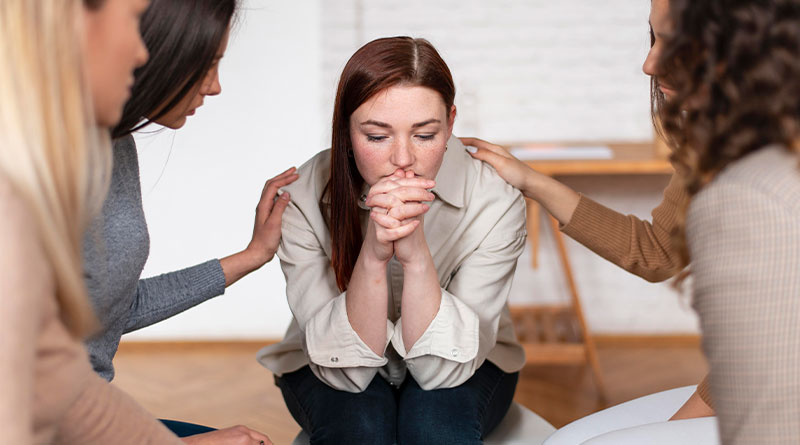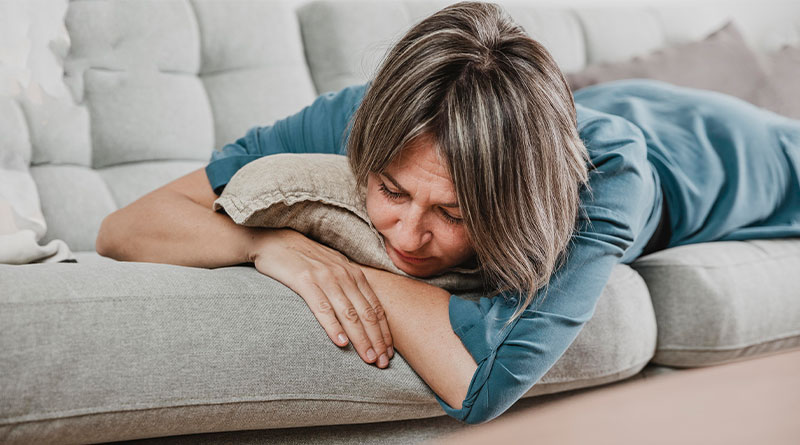According to the World Health Organization, women are twice as likely to experience depression than men. Women are more likely to experience depression than men, and the condition can be influenced by a variety of factors, including genetics, life experiences, and hormonal changes.
In this blog, we will discuss some of the signs of depression in women.
Find the Signs of Depression in Women
Depression in women is a complex and multifaceted issue that can have a significant impact on their mental, emotional, and physical health. Find some signs below;
Feelings of sadness and hopelessness
One of the most common signs of depression in women is persistent feelings of sadness and hopelessness. If you find that you are feeling down, low, or unhappy most of the time, even when good things happen in your life, it could be a sign of depression. You may feel like there is no hope for the future, or that you are stuck in a negative cycle that you can’t break free from.
Loss of interest in activities
Another common sign of depression in women is a loss of interest in activities that they used to enjoy. If you find that you no longer take pleasure in things that you used to love, such as hobbies, socializing with friends, or even your favorite TV show, it could be a sign of depression.
Changes in appetite or weight
Depression can also affect your appetite and weight. You may find that you are eating more or less than usual, or that you have lost or gained weight without trying. If you find that you have lost your appetite or are overeating, it is important to speak to a healthcare professional.
Difficulty sleeping or oversleeping
Sleep is essential for good health, but depression can affect your sleep patterns. You may find that you have difficulty falling asleep, staying asleep, or that you wake up too early. Alternatively, you may find that you are sleeping too much and still feeling tired when you wake up.
Fatigue or lack of energy
If you are experiencing depression, you may feel exhausted and lacking in energy, even if you have not done anything physically demanding. This can make it difficult to complete everyday tasks, such as getting dressed or going to work.
Difficulty concentrating or making decisions
Depression can also affect your ability to concentrate or make decisions. You may find that you have trouble remembering things, or that you struggle to focus on tasks that you used to find easy. This can affect your work, your relationships, and your overall quality of life.
Feelings of guilt or worthlessness
Another common sign of depression in women is feelings of guilt or worthlessness. You may feel like you are not good enough, or that you are a burden to those around you. These feelings can be overwhelming and may lead to negative thoughts and behaviors.
Irritability or agitation
Depression can also cause irritability or agitation, which can affect your relationships with others. You may find that you are easily annoyed or angered by things that would not normally bother you, or that you are more short-tempered than usual.
Physical symptoms
Depression can also cause physical symptoms, such as headaches, muscle aches, and stomach problems. These symptoms are often a result of the stress and tension that comes with depression.
Loss of libido
Depression can affect a woman’s sex drive or libido. She may find that she has little or no interest in sex, or that she is unable to become aroused or experience pleasure. This can lead to strain on relationships and feelings of guilt or shame. It’s important to talk to a healthcare professional if you are experiencing a loss of libido along with other symptoms of depression.
Difficulty with self-care
Depression can make it difficult to take care of yourself and your personal hygiene. You may find that you are neglecting tasks such as showering, brushing your teeth, or getting dressed. This can further contribute to feelings of guilt and worthlessness, and may make it harder to seek help.
Understanding the Unique Types of Depression That Affect Women
While depression can affect anyone, there are some types of depression that are more common in women than in men. Below, we will discuss some of the types of depression that are unique to women;
Premenstrual dysphoric disorder (PMDD)
PMDD is a severe form of premenstrual syndrome (PMS) that affects some women in the days leading up to their menstrual cycle. Symptoms of PMDD can include mood swings, irritability, anxiety, depression, and physical symptoms such as bloating and fatigue. PMDD is thought to be caused by hormonal changes in the body, and treatment may include medication, therapy, and lifestyle changes.
Perinatal depression
Perinatal depression is a type of depression that can occur during pregnancy or after childbirth. It is estimated that up to 20% of women experience perinatal depression. Symptoms can include feelings of sadness or hopelessness, anxiety, irritability, difficulty sleeping, and changes in appetite or weight. Perinatal depression can be treated with therapy, medication, or a combination of both.
Premenopausal and menopausal depression
Hormonal changes during perimenopause and menopause can also lead to depression in some women. Symptoms may include mood swings, irritability, anxiety, and feelings of sadness or hopelessness. Treatment may include hormone therapy, antidepressant medication, therapy, and lifestyle changes.
Postpartum depression (PPD)
PPD is a type of depression that affects some women after giving birth. Symptoms can include feelings of sadness or hopelessness, irritability, difficulty sleeping, and changes in appetite or weight. PPD can also include thoughts of harming oneself or one’s baby. Treatment for PPD may include therapy, medication, and support from loved ones.
Women’s Strategies for Dealing with Depression
Depression is a common mental health condition that affects millions of people worldwide. Women are more likely to experience depression than men, and it can be particularly challenging to navigate due to societal expectations, cultural norms, and biological factors.

However, women have developed various strategies to manage and cope with depression, allowing them to lead fulfilling lives despite the challenges.
- Seeking professional help: Women often seek help from mental health professionals to manage their depression. This can include therapy, counseling, or medication. Professional support can help women process their emotions, develop coping mechanisms, and work toward recovery.
- Self-care practices: Women often engage in self-care practices such as exercise, mindfulness, and relaxation techniques. These practices help to reduce stress, improve mood, and promote overall well-being.
- Social support: Women may also rely on social support from friends, family, or support groups. Having a support network can provide a sense of belonging, reduce isolation, and offer practical and emotional support.
- Setting realistic goals: Depression can make even the simplest tasks feel overwhelming. Women who set small, achievable goals for themselves can build momentum and improve their sense of accomplishment.
- Establishing routines: Establishing a routine can help women stay on track with their goals and feel a sense of structure and predictability. This can include scheduling regular meals, exercise, sleep, and other activities.
- Embracing creativity: Creative expression can be a powerful tool for managing depression. Women may engage in activities such as writing, painting, or music to express their emotions and connect with their inner selves.
If you are experiencing any of these signs of depression, it is important to seek help from a healthcare professional. By taking care of their mental health, women can lead fulfilling lives and achieve their full potential.
FAQs
Q: How can I tell if I have depression or just feel sad?
Ans: While feeling sad is a normal part of life, depression is a persistent and serious mental health condition that can affect many areas of your life. If you are experiencing several of the symptoms of depression, such as persistent feelings of sadness, loss of interest in activities, changes in appetite or weight, difficulty sleeping or oversleeping, fatigue or lack of energy, difficulty concentrating or making decisions, feelings of guilt or worthlessness, irritability or agitation, or physical symptoms, it is important to speak to a healthcare professional.
Q: What should I do if I think I have depression?
Ans: If you think you may have depression, it is important to seek help from a healthcare professional. Your doctor can help you determine if you have depression and develop a treatment plan that is right for you. Treatment for depression may include therapy, medication, or a combination of both.
Q: Can depression be treated without medication?
Ans: While medication can be an effective treatment for depression, there are also other options available. Therapy, such as cognitive-behavioral therapy (CBT), can help you learn coping strategies and address negative thought patterns that contribute to depression. Other treatments for depression may include exercise, self-care, and support from friends and family. It is important to work with a healthcare professional to develop a treatment plan that is right for you.
Q: Can depression go away on its own?
Ans: While some people may experience temporary periods of depression, such as after a difficult life event, clinical depression is a persistent and serious mental health condition that requires treatment. It is important to seek help from a healthcare professional if you are experiencing symptoms of depression, as treatment can help you feel better and improve your quality of life.
Q: Can depression affect physical health?
Ans: Yes, depression can have physical effects on the body. It can weaken the immune system, increase inflammation, and contribute to chronic pain conditions. Depression can also lead to changes in appetite and weight, as well as disrupted sleep patterns. In some cases, depression can even increase the risk of developing certain medical conditions, such as heart disease and diabetes. It is important to address both the mental and physical aspects of depression in order to achieve optimal health.
Sahil Sachdeva is the Founder of curemedoc.com and a Digital Marketing professional with 6+ years of experience. If you need help in Content writing and want to increase your website ranking, connect with him, as he has some premium websites where you can share blogs with DoFollow links and increase your website’s ranking on Google.





